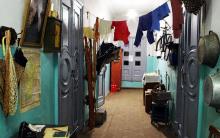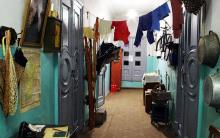Due to the economic crisis in our country in recent years, experienced tourists have to think about how to save money on travel, how much to spend on an overnight stay, and accordingly they are looking for budget analogues to hotels and inns.
History of hostels. Many people think that this is a new phenomenon, but in fact hostels have existed for many centuries. In Rus', these were inns, where a common roof over one's head and a hayloft were provided as a place to spend the night. They were placed near roads so that travelers could easily find them. However, the founder of the hostel is considered to be the German teacher Richard Schirmann.
He was prompted to create a hostel by the problem of finding a good place to stay during school excursions. Accordingly, with a lot of effort, in 1907 he opened the first hostel in Altena Castle in Westphalia, renovated with donations from citizens.
In addition to inexpensive housing, Schirmann saw the purpose of hostels as social adaptation of children and teaching them to be independent. Teenagers learned to work as a team, to act simultaneously and clearly. The children in the hostel cleaned their homes, washed dishes and did other household chores on their own.
The successful idea of the German teacher was accepted and began to be disseminated in other countries. Some hostels still ask guests to clean up after themselves and wash their dishes.
In the USSR, communal apartments became the image of hostels, although for residents this was not temporary housing, but permanent or long-term housing. In one apartment with one shared bathroom and toilet and a single kitchen, there lived as many families as there were rooms in the apartment. The residents were from different social backgrounds and different genders. In a room of 18 sq. m lived a husband, wife, two children; in larger rooms, as a rule, three generations of the same family lived. Since there were no comfortable bunk beds on sale, screens were popular for separating sleeping places; a little later, chair-beds were invented.

In the USA, it was often possible to find shared apartment rentals. Essentially, this is a hostel, since strangers live in the same home, sharing a bathroom, living room and kitchen. In Russia, such rentals are popular among students who come to study from remote cities.
As Richard Schiermann's creation spread massively throughout the world, the International Hostel Association was eventually created ( HI - Hostelling International), which currently has branches in 80 countries around the world. The association includes representatives of more than 4,500 hostels.
Modern hostel. Over time, of course, a lot has changed in hostels. Today's hostel is almost nothing like the very first hostel; in fact, from Schirmann's first idea, only the most important principle of shared accommodation has been preserved. Now hostels offer their guests various amenities to the maximum: transfer from the airport, train station and back, WiFi in the rooms, swimming pools and saunas, transport rental. The main and constant highlight of hostels compared to other temporary accommodation options remains their low cost. For those who like to spend the night only with family or alone, some hostels have single and double rooms. You can see what a modern hostel looks like
For many Russians, the concept of “hostel” evokes unpleasant associations with something unkempt and uncomfortable. This is largely due to the prevailing image of dormitories with their dark corridors and peeling paint on the walls. In fact, modern hostels are almost in no way inferior to small hotels; they have all the necessary amenities. Booking these hotels at a reasonable price will give you the opportunity to stay in a room designed for several people, with a shower on the floor or even in the room, as well as a kitchen where you can always prepare your own food.
How it all began?
In general, the idea of inexpensive accommodation is far from new. In Russia, for example, since ancient times there have been inns, where you could even spend the night in the hayloft. However, the creator of the first hostel is considered to be a school teacher from Germany, Richard Schirmann, who at the beginning of the last century organized excursions to other cities for his students.
Mostly, the children were from poor families and did not have the opportunity to pay for overnight accommodation. We stayed at schools, because there were no classes there on weekends anyway. It was then that Schiermann decided to organize overnight stays for traveling youth at his school. Students helped him: in the evening they emptied the classrooms of their desks and laid sacks filled with straw on the floor. In the morning everything returned to its place.
Popularity among young people
Gradually, hostels began to open all over the world, but for a long time they were mostly occupied by poor students who came to a foreign city to study.
In the 60s, hippies played a big role in the development of hostels. Adherents of the most popular youth movement in those days led an active life, traveled a lot around the world, not wanting to stay in one place for long. They cared little about their own comfort; in addition, there were a large number of like-minded people in the hostels, which made life even more interesting.
A hostel is an inexpensive alternative to hotels, allowing tourists to rent a bed in a shared room. Depending on the level of equipment, alternative accommodation offers tourists all the amenities. You can prepare your own breakfast, take a shower, and put your things in a locker that can be locked with a key. The history of hostels began in Germany, but today it is not a problem to rent an inexpensive hostel in Moscow or Paris, or rent a bed in India or Paraguay.
First hostel
The founder of inexpensive tourist accommodation is considered to be Richard Schirmann, a school teacher from Germany. To ensure that his students spent their weekends productively, he regularly organized short trips for them. There was nowhere to spend the night, there was not enough money for hotels, and Schirmann asked local school teachers to shelter him and his charges. He was not refused, and for travelers the classrooms of local schools turned into temporary shelters.
In 1909, Richard Schirmann decided to organize a semblance of a modern dormitory in his own school. There were no beds, but the travelers were quite happy with the mattresses with straw that were scattered on the floor of the classrooms in the evening. In the morning everything was cleaned up, and the classrooms again turned into a territory of knowledge.
Industry development
Without exaggeration, a modern hostel can be considered the most popular type of overnight accommodation among budget tourists. Having emerged, this area of tourism business developed rapidly. The peak of popularity occurred in the pre-war 30s and the post-war stage, when hostels for working youth and students were organized everywhere in Moscow, St. Petersburg and other cities of the USSR.
Hostels of the 21st century are well-equipped dormitories, where they are clean and comfortable, regularly cleaned and have the opportunity to use Wi-Fi, an iron, a modern washing machine and kitchen appliances. You can find such a hostel in Moscow for a few nights or for a longer period. Typically, long-term rental of inexpensive housing is of interest not to tourists, but to students and people coming from regions of the Russian Federation and CIS countries to work in the capital.
Hostel - hostel) - a European accommodation system that provides its guests with short- or long-term housing, which is, as a rule, sleeping area without additional amenities in the room.Historically, hostels are a kind of symbiosis of European apartments, Russian apartment buildings and American motels, which hundreds of years ago offered picky travelers an inexpensive place to stay the night. The very first hostel in the current meaning of the word was founded at the beginning of the twentieth century, in 1909, in Germany. One day, a schoolteacher named Richard Schirmann decided to take his students out of town on weekends. The schoolchildren were from poor families; it was not possible to spend the night somewhere for money. We spent the night in local schools - they were empty on weekends and holidays anyway. Gradually, the idea of inexpensive accommodation for young people, which would operate on a permanent basis, formed in Schirmann’s head. The teacher set up the first such hostel right in the school where he worked. In the evening, Schirmann and several students removed desks and chairs from the classrooms, and placed bags of straw on the floor. Early in the morning, the guests helped the teacher take out these makeshift beds and put back the desks and chairs. Over time, the first hostel moved to Altena Castle. By the way, it still exists there.
Description of standard services
The bathroom, shower and kitchen are shared, but usually this does not cause problems, since the average person only uses the toilet in the morning and evening. Several strangers can live in the rooms at the same time, but often the room is rented by a large group or it is purchased entirely, since it is still cheaper than a hotel room. Hostels are in demand among lovers of inexpensive travel, so they focus mainly on young people, sports teams, and pilgrims. The disadvantages of hostels include: the need to share accommodation with strangers, the risk of theft, etc., but most hostels have safes.
The first Hostel in the world - let's dive into history
The first, so-called hostels, appeared many centuries ago - these were roadside taverns that offered inexpensive beds for travelers to spend the night. However, the very first Hostel, in the current sense of the word, appeared only in 1907, the founder of which was the German teacher Richard Shearman. It all started when he decided to take country walks with his students on weekends. But since the students were from poor families, it was not easy for them to find a cheap place to stay. Therefore, the teacher organized sleeping places in schools that were free during vacations and holidays. Later, he came up with the idea of creating permanent overnight stays for young travelers at the school where he himself worked. So, in the evenings, all the furniture was removed from the classrooms, and bags of straw were laid on the floor. In the morning, the residents helped rearrange the tables and chairs and put the classroom in order. In 1912, the Hostel was moved to Altena Castle, which became the world's first permanent hostel hotel for traveling school groups. Now a similar network exists all over the world.
In the 20-30s, several more hostels opened in European countries. And therefore, in order to unite them, the International Federation - IYHF - was formed in Amsterdam in 1932.
The idea of low-budget tourism, in the middle of the last century, was helped to develop by hippies - at that time backpacking (translated from English as backpack) came into fashion. Thus, the constant wanderlust and the satisfaction of travelers with a minimum number of amenities has led to a large increase in the popularity of hostels.
A century later, hotel dormitories have undergone great changes. They are now equipped with telephones, televisions, microwaves, refrigerators, hair dryers, air conditioning and Internet connections. Only the democratic spirit has not changed in them - after all, the cost of an overnight stay is still profitable for tourists who want to save on accommodation.
As a rule, such mini-hotels have rooms of varying capacity (from 2 to 12 beds) with amenities in a block of several rooms, or with amenities in the room itself. Of course, the fewer amenities you are provided with, the less you pay.
According to the rules established by the International Federation IYHF, the hostel must have cold and hot water. In some cases, bed linen is provided for a fee. Breakfast may be included in the room rate, and if the premises have a kitchen, guests can prepare their own meals.
One of the important details is that the hostel must provide a guarded room or lockers in which you can leave your belongings.
Now, as in the last century, university dormitories in many countries turn into hostels during the holidays, but only if the holidays last more than a week. In some countries of Eastern Europe, only tourist groups are accommodated, and a single tourist may not be accepted. Alas, this also happens...
- Booking.com
- LeadBack
- 1c accounting
- Skype
Inna Potselueva most likely never knew the basic formula that running a business requires labor, land, capital and entrepreneurial abilities. A successful and popular TV and radio presenter, who earns money in her free time by hosting holidays and corporate events, she lived a completely self-sufficient life until she became the owner of a hostel in September 2014. A hostel is a hotel in which guests book not a room, but a separate bed - like in a dormitory. This format is popular in Europe and is actively gaining momentum in Russia. Inna Potselueva told Biz360 about the nuances of this difficult business.
Entrepreneur, owner. Born in Tomsk. Education: Tomsk State University, Faculty of Journalism. Before buying her own business, she worked as a television and radio presenter, and also hosted entertainment and corporate events. The Moscow AppleHostel has a namesake and a sister city in St. Petersburg, but they no longer have a legal direct relationship to each other. Inna Potselueva's hostel has five rooms: one for ten people, an eight-bed room for women, six- and four-bed rooms, and a three-bed family room. In addition, there is a living room, a kitchen with a full set of utensils, three showers and two bathrooms.
Between the air and the hotel
Inna Potselueva was given the idea of becoming a hostess by her friends. One of them, together with his partner, opened his own mini-hotel in the summer of 2014. Both entrepreneurs did not have cars, and they periodically asked Inna to help them: take them to Mega and other Ikeas to buy something for their brainchild. The flexible work schedule on the radio allowed Inna to manage her time quite freely, and she was happy to join this venture. After looking at the enthusiasm of her friends, she decided that she should start the same business for herself. And then the previous owners put AppleHostel up for sale.
“Then everyone heard the same thing: a hostel is the surest and most profitable way to invest money,” Inna recalls. – Investments are recouped in a maximum of six months, and then - 10 thousand dollars in monthly profit without much hassle. I just have 50 thousand euros accumulated in my stash. I wanted to invest them.”
I understood that building a hostel from scratch is very difficult. Repair, design, launch, promotion... And here everything is ready, ratings on booking systems are good, reviews. I thought - I’ll buy it now, in six months I can install a manager, move somewhere on the shore of a warm sea and live comfortably and happily. If only I knew what I was getting myself into!
We agreed on a price, signed the papers, and on September 10, 2014, Inna became the owner of the already very popular Moscow Apple Hostel.
Inna does not name the amount of the transaction, but says that the nest egg of 50 thousand euros was enough for her and there was still a little left. In return, she received, firstly, premises - an apartment on the fourth floor in a building on Maroseyka, 13. Five minutes from the Kitay-Gorod metro station, the very center. The apartment itself remained the property of its owner, and Inna was given the opportunity to rent. And on very friendly terms. All movable property was attached to it: beds, bedside tables, televisions, toilets, and so on, and a staff. By the way, Inna did not change the staff, although many advised her to recruit a new team. And, perhaps, most importantly - ratings on booking systems. It is on them, as well as on the positive reviews of other travelers, that guests rely when choosing a place to stay.
“They also wanted to transfer the legal entity of the hostel to me,” says Inna. – Before me, Apple Hostel had two owners, but some kind of dirty story happened between them. As a result, the existing legal entity turned into a garbage dump, so there was no point in me getting involved in it. And at that moment the rules for registering limited liability companies changed. And when I ran with my misfortune to the accounting firm with which I had worked before - when I was organizing and holding events, they just shrugged their shoulders. Like, you need a cash register, and to set up a cash register, you need an organization. As a result, for a month and a half, while they heroically fought their way through the new LLC registration procedure, we worked with the old control machine, collecting taxes on our predecessors. But since then, all my financial statements are white and fluffy.”
Deep corkscrew
Over the summer of 2014, the number of hostels in Moscow almost doubled. And the number of guests began to actively decline - after the story with Crimea and the adoption of one after another package of sanctions against Russia, many foreigners began to refuse to travel to our country. Namely, they constitute, although not the overwhelming majority of clients for such hotels.
“In September I still had people, and then less and less and less,” shares Inna. – By the New Year, there were literally only a few people left in 34 beds. There is almost no income, and costs are under 350 thousand rubles. Because even if two people live, even if there is no one, I have to pay the rent to the owner of the apartment, pay the administrators, the manager, the cleaning lady - that’s all about 120 thousand a month. There is also a communal apartment - the electricity bills are simply huge, laundry services, ordering drinking water, cleaning products, stationery, tea-coffee and other goodies provided to our guests for free. It is clear that when there are fewer people, some expenses are reduced. But there are also fixed costs. It’s good that I had two more jobs at the time. I broadcast, rocked events and brought everything I earned there here. I still may not pay myself any money, but what are the employees to blame for?”

You can increase hostel income by increasing the number of clients. Where can you get them from if you don’t reduce the price - it’s already more than attractive? More than half of the guests are provided by booking systems: Booking.com, HostelWorld and others. There, either completely new hostels are displayed on the first lines in the search lists - this is how the resource administration helps them promote themselves - or those with a high rating. Inna’s reviews were all right.
Basic prices of AppleHostel are from 650 to 800 rubles per bed in a multi-bed room (cheaper in a ten-bed room), 2100 or 2700 rubles per night in a “family” room (for two or three people, respectively).
Clients can also be regular or repeat clients. They don’t look for anything anywhere anymore, they just call and come. Since AppleHostel had already been operating for three years by that time, this category consistently provided and continues to provide approximately a third of the occupancy. The rest come either on recommendation or by chance. But in those months there were still no people.
“That winter we were saved by Brazilian students who, at the expense of the budget, went to study in Europe for a year,” Inna recalls with a smile. – The first batch appeared in November. The guys from the University of Liverpool decided to look at Russian snow and came to Moscow, choosing us by chance. The empty hostel was filled almost to capacity. We stayed for a few days and asked to organize snowboarding for them. I looked at them: what are you going to ride in? You'll freeze! They just shrugged their shoulders. As a result, they not only organized a ride for them and helped them with equipment rental, but also found suitable clothes for the time being. Then they left, and after a while I saw another brigade of Brazilians arriving. I tell them: “How great! And before you, students from Brazil lived here...” And they answer me: that’s what they advised you to do. And so several groups - they simply passed the baton on to us. If it weren’t for them, it would be very difficult to survive.”
Inna’s hostel has one more tenant who does not fall into any of these categories. He is permanent. He’s been living in the Apple Hostel for over a year now—it’s just more convenient for the guy. His staff even jokingly calls him “our dad” for his readiness to help at any second with various small men’s tasks: fixing something, screwing something, moving it, hanging it. The team is female...
“In the first six months I brought myself to a nervous breakdown,” shares Inna. “It felt like I buried myself under it all.” And for your own money. Then it eased up a little - probably the pain threshold changed. From time to time I was overcome by a feeling of hopelessness: I don’t understand where people are, I don’t understand what’s happening, why all this isn’t working. But at that moment my manager went on maternity leave. And instead of her, my photographer friend appeared, who still had enough time after filming. She just decided to try herself in a new business.
Together we began to figure out what and how it worked. We quickly realized that her predecessor either didn’t know something or didn’t want to know. We optimized the work with booking systems, came up with a system of discounts, and rebuilt the hostel inside: instead of one six-bed room, they made a three-bed “family” room. They added free breakfasts for guests - porridge, muesli, sandwiches, jam - not that expensive, in fact, but after such food you can easily run into the city for the whole day. And the people went. And then winter ended, and in spring and summer the flow still increases. There was a breakthrough. They told me that the business gets back on its feet in a year - by September this deadline had just arrived, and we began to make a profit.”
What they fought for
Despite the fact that overall AppleHostel turned out to be a plus, problems still remained. Moreover, they must be resolved immediately.
“We calculated today - for last month our result was minus 12 thousand rubles,” explains Inna. - That is, I have to pay this money out of my pocket. And tomorrow I need another 60 thousand rubles. Where can I get them? I don’t know, but I still have almost a day for this.”
This winter, the hostel’s occupancy was brought closer to optimal. After the restructuring, Inna had 31 beds left at her disposal, of which usually no more than a dozen are empty. True, to achieve this, we had to create special promotions with big discounts. When booking day-to-day – 30 percent, for a week – 12 percent, for a month – 23 percent.
For each client received through the booking system, at least 15 percent must be given to the intermediary. Accordingly, the hostel itself can only receive half of the base price. By the summer, when there will be more tourists, such promotions will no longer be needed, and income will increase. But to survive in the low season, you need to minimize the price. Hostels located in their own premises can easily afford such marketing moves. And AppleHostel rents the apartment itself, which makes its costs much higher.
“I am now actively trying to attract universities and all kinds of training centers where people come from the provinces to study for a couple of weeks,” Inna shares sources of possible growth. – For people from regions with an average salary of 20-30 thousand rubles, renting a hotel room for such a time is too expensive. With me they will live quite on a budget. So far there are very few such guests, but they are a very grateful audience: they have something to do, and they want to rest at night. I make sure to pay agency fees to everyone who supplies me with clients. So such cooperation turns out to be beneficial for everyone.”
Some time ago, Inna stopped working on the radio; the number of orders for events has recently decreased significantly due to the crisis. Therefore, she can devote as much time as needed to her brainchild. Sometimes she herself sits as an administrator on duty, taking on 2-3 shifts a week. He goes to negotiations and tries to attract new clients.
This is a living organism. It happens that I don’t come here for several days. And then you look - it’s not cleaned, the tenant has stopped making the bed, it’s not entirely clean, the debtor lives here. Or the blanket on the living room sofa has become tangled. I have very good girls-administrators, but anyway, either you have to look after everything here yourself, or your manager. Otherwise it doesn't work.
Among the immediate plans for business development is to purchase bedside lamps so that those who wish can read in bed after the official “lights out”. If at least one person in the room wants to sleep, the overhead light must be turned off after 23.00. You can hang out longer in the living room or kitchen. And then one of the guests complained that he didn’t have a sconce. We found inexpensive light bulbs of a suitable design on the Internet. As soon as a few thousand rubles are available, they will be ordered.
Residents, neighbors and inspectors











Traffic manager: features of remote work Traffic manager in an advertising agency
Several ways to use neodymium magnets Neodymium magnets in a hard drive
Aeroflot has come up with a new name for the Far Eastern airline
How to create passive income from scratch?
Hockey Club "Zauralye HK Tsen Tou Jilin"